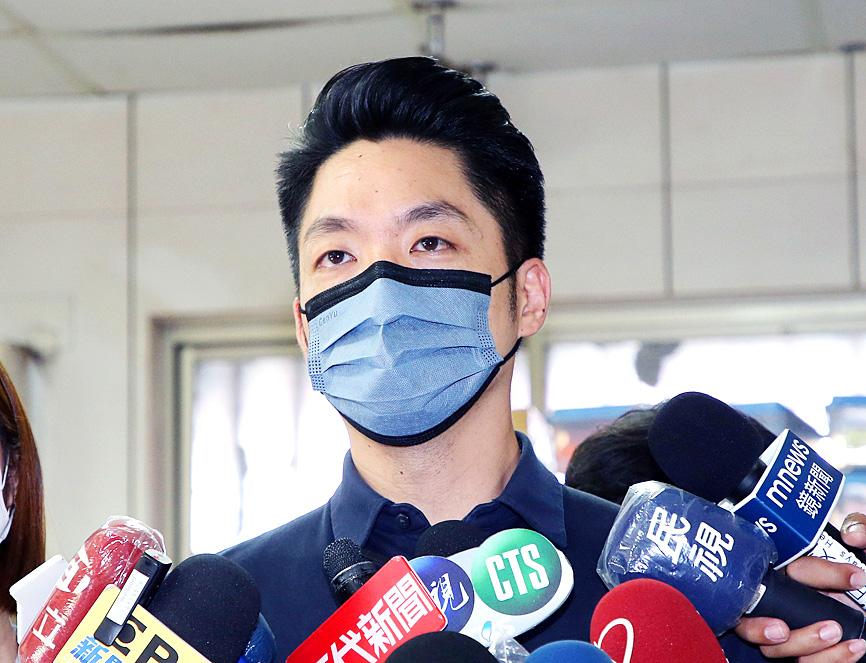A Chinese Nationalist Party (KMT) delegation visiting China has continued to spark controversy, with politicians within and outside the party saying the group is raising funds from Taiwanese businesspeople there for the Nov. 26 local elections.
KMT Taipei City Councilor Lee Ming-hsien (李明賢) said he has from the very start opposed the visit by the delegation, led by KMT Vice Chairman Andrew Hsia (夏立言), and has heard talk within the party that the group has been mandated to solicit donations from the Taiwanese community.
However, “the more money Hsia gets during the visit, the more votes our party will lose at the grassroots level,” Lee said.

Photo: CNA
Democratic Progressive Party (DPP) Legislator Liu Chao-hao (劉櫂豪) said he has also heard the same rumor in political circles and understands a party’s need to procure funding, but “any political party must differentiate where it is getting the donation from and what price it has to pay for it.”
Local media reports have also cited KMT officials, speaking on condition of anonymity, as saying the same thing.
“In the recent elections, the pan-blue camp was short of funds and had difficulty running campaigns. This is why we need a top official — such as a vice chairman — to engage and interact with Taiwanese businesspeople in China,” a KMT official said.
“If he is successful in procuring more funds, it would really help in this coming election, which involves city mayors, county commissioners and local councilors. For our party, this would be life-saving money to raise our chances of winning,” the official said.
Other media reports quoted KMT members as saying that the party’s priority is to secure wins for the mayoral contests in the six special municipalities by providing financial and other campaign resources, with the most important goal being to help KMT Legislator Chiang Wan-an (蔣萬安) win the Taipei mayoral race.
Asked about the reports while canvassing votes in Taipei, Chiang said that to his knowledge, the delegation’s visit “is to find the problems and difficulties facing Taiwanese businesspeople, students and entrepreneurs in China.”
Taiwan Thinktank member Tung Li-wen (董立文), a DPP member, said that if the reports are true, it could be a violation of the Political Donations Act (政治獻金法), which says Taiwanese are eligible to donate and contribute funds to political parties for campaigning activities, but there are key restrictions and prohibitions on the sources of funding.
Tung said the delegation would meet with Taiwanese businesspeople, but they are being monitored by China’s Taiwan Affairs Office and other Chinese officials.
“It is the Chinese side that must approve and give the green light to certain Taiwanese business figures in China on donating election funds to the KMT,” he said.

Taiwan would welcome the return of Honduras as a diplomatic ally if its next president decides to make such a move, Minister of Foreign Affairs Lin Chia-lung (林佳龍) said yesterday. “Of course, we would welcome Honduras if they want to restore diplomatic ties with Taiwan after their elections,” Lin said at a meeting of the legislature’s Foreign Affairs and National Defense Committee, when asked to comment on statements made by two of the three Honduran presidential candidates during the presidential campaign in the Central American country. Taiwan is paying close attention to the region as a whole in the wake of a

President William Lai (賴清德) has appointed former vice president Chen Chien-jen (陳建仁) to attend the late Pope Francis’ funeral at the Vatican City on Saturday on his behalf, the Ministry of Foreign Affairs said today. The Holy See announced Francis’ funeral would take place on Saturday at 10am in St Peter’s Square. The ministry expressed condolences over Francis’ passing and said that Chen would represent Taiwan at the funeral and offer condolences in person. Taiwan and the Vatican have a long-standing and close diplomatic relationship, the ministry said. Both sides agreed to have Chen represent Taiwan at the funeral, given his Catholic identity and

Lawmakers from the Democratic Progressive Party (DPP) yesterday established a friendship group with their counterparts in Ukraine to promote parliamentary exchanges between the two countries. A ceremony in Taipei for the Taiwan-Ukraine Parliamentary Friendship Association, initiated by DPP Legislator Chen Kuan-ting (陳冠廷), was attended by lawmakers and officials, including Deputy Minister of Foreign Affairs Francois Wu (吳志中) and European Economic and Trade Office in Taiwan Director Lutz Gullner. The increasingly dire situation in Ukraine is a global concern, and Taiwan cannot turn its back when the latter is in need of help, as the two countries share many common values and interests,

Chinese Nationalist Party (KMT) Chairman Eric Chu (朱立倫), spokeswoman Yang Chih-yu (楊智伃) and Legislator Hsieh Lung-chieh (謝龍介) would be summoned by police for questioning for leading an illegal assembly on Thursday evening last week, Minister of the Interior Liu Shyh-fang (劉世芳) said today. The three KMT officials led an assembly outside the Taipei City Prosecutors’ Office, a restricted area where public assembly is not allowed, protesting the questioning of several KMT staff and searches of KMT headquarters and offices in a recall petition forgery case. Chu, Yang and Hsieh are all suspected of contravening the Assembly and Parade Act (集會遊行法) by holding